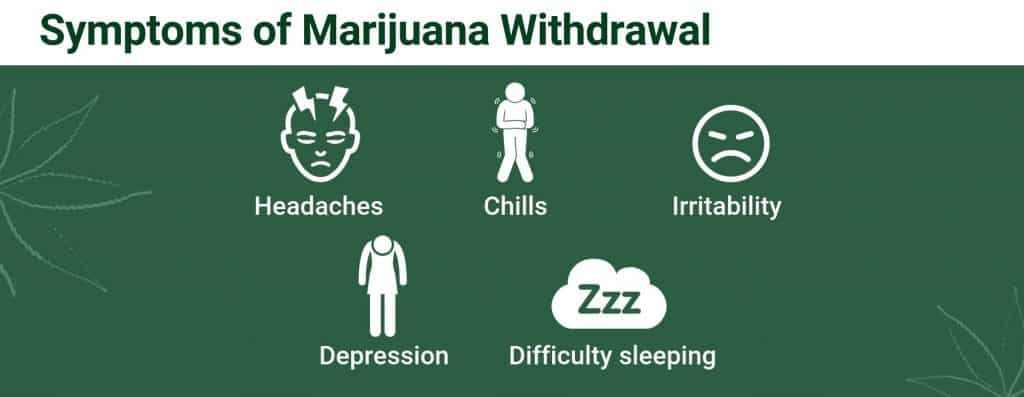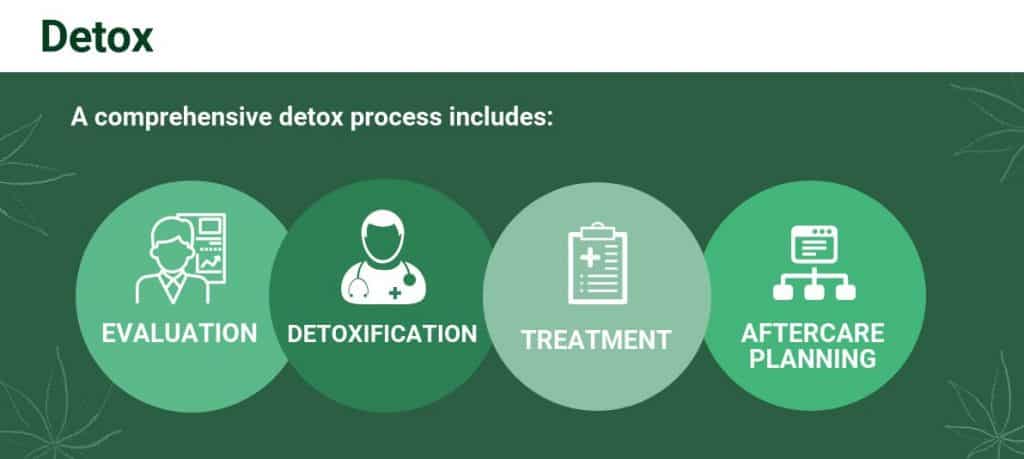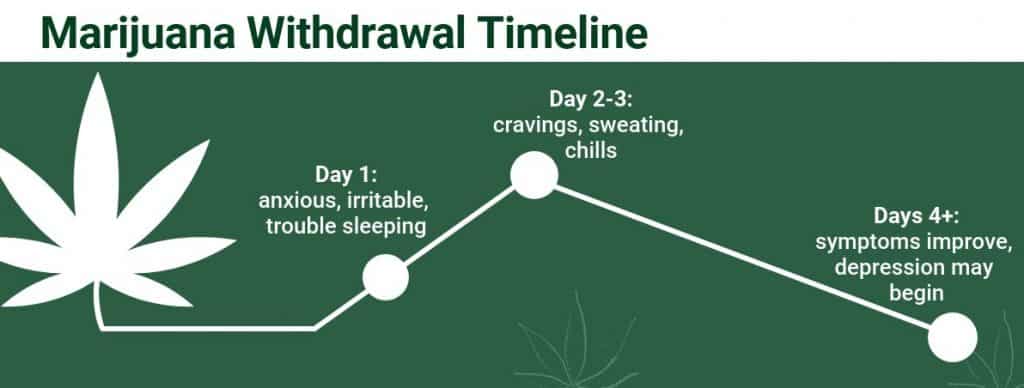Although some believe weed’s not addictive, studies highlight certain marijuana withdrawal symptoms that can increase the likelihood of dependency.
Article at a Glance:
- Headaches, irritability, sweating, nausea and difficulty sleeping are symptoms of marijuana withdrawal.
- Generally, weed withdrawal symptoms peak during the first week after quitting and begin to improve within two weeks.
- Weed withdrawal is often most comfortable in a medically supervised facility, where doctors and nurses can monitor symptoms and help with discomfort.
- The Recovery Village’s detox process includes detoxification,marijuana addiction treatmentand aftercare planning.
- No specific medications curb marijuana cravings, so it is important to avoid environments and people who hinder your recovery.
When a person who frequently uses large amounts of marijuana suddenly stops, they can go into withdrawal. As with many other drugs, marijuana withdrawal can be very uncomfortable and often causes people to begin using the drug again.
For this reason, a marijuana detox program can help increase the chances of long-term recovery. In marijuana detox, you can take your first steps toward sobriety in a safe, secure environment where withdrawal symptoms are managed by a team of medical professionals.
Marijuana Withdrawal Symptoms
Heavymarijuana usecan cause chemical changes in the brain, making the personphysically dependenton the drug. These chemical changes are why a person might have uncontrollable cravings to use marijuana; it’s also why their body may have unpleasant reactions when they stop using it. These reactions are part of withdrawal and are why marijuana is anaddictive drug.

Although some believemarijuana is not addictive,marijuana addictionis possible — especially in adolescents. People who use marijuana before the age of 18 are four to seven timesmore likely to develop marijuana addictionthan adults. In other words, the earlier in life a person starts using marijuana, themore likelythey are to become addicted to the substance.
Withdrawal from marijuana is also known as marijuana withdrawal syndrome. Symptoms of marijuana withdrawal syndrome mayinclude:
- Marijuana cravings
- Thirst
- Dry mouth or throat
- Hunger
- Mellow feelings
- Increased appetite
- Increased sexual arousal
- Strange or vivid dreams
- Irritability and anger
- Restlessness
- Depression and anxiety
- Nervousness
Severity of Symptoms of Weed Withdrawal
There are many different factors that affect marijuana withdrawal symptoms. Symptoms are typically more pronounced withchronic, frequentmarijuana use. In other words, people who have used large amounts of marijuana for a long time may have more severe withdrawal symptoms. This is because it’s more likely that the person will have a heavy physical dependence on marijuana when they quit. If marijuana is combined with other substances, such as illicit drugs oralcohol, withdrawal symptoms may be heightened as well.
Withdrawal Symptom Complications
Detoxing from marijuana often causes side effects and withdrawal symptoms that are uncomfortable at best. For example, thirst is one of themost commonwithdrawal symptoms. If a person does not drink enough water over several days or even weeks, they can easily become dehydrated. Dehydration will likely deplete nutrients that the body needs to maintain optimal health. If dehydration becomes severe enough, it can cause potentially fatal seizures.
Withdrawal can feel like an illness, so it’s important to go through it with the right help. It’s often more comfortable to begin the withdrawal process in a medically supervised facility, where doctors and nurses can monitor symptoms and help with discomfort. They may administer over-the-counter medications to help with common side effects, such as headaches and flu-like symptoms. Prescription medications may be used to treat more serious symptoms, such as tremors and insomnia.
Marijuana Detox
Marijuana detox can cause withdrawal symptomsbecauseof the body’s physical dependence on delta-9-tetrahydrocannabinol (THC), a chemical found in marijuana. THC can cause both psychological and physical changes in the body, complicating the quitting process.
During detox, the body has to recalibrate itself because the drug it’s dependent on is no longer present. The resulting withdrawal symptoms can be very unpleasant, and certain forms of detox only make them worse.
Marijuana Detox and Withdrawal Timelines

The marijuana detox and withdrawal timeline can vary depending on a variety of factors, such as the severity of the addiction and the detox method used. Further, detox is typically just one small part of recovery — it’s what comes next that can really make a difference in long-term healing. If you undergo treatment at arehab centerlike The Recovery Village, detox will be the first crucial step in recovery from marijuana.
Withdrawal Detox Timeline
Whether you complete detox at arehabilitation centeror at home, the timelines for detox and withdrawal can vary. The timeline may be a relatively small window for some people, while others may take days or weeks to overcome withdrawal symptoms. If you are participating in a rehab program, you can expect to stay in medical detox for a week or more. Keep in mind that the detox timeline is unique to every person, so what may only take a few days for one person to accomplish could take weeks or months for someone else.
Duration of Withdrawal Symptoms
Symptoms may persist for days after detox. During thefirst three daysof detox, a person is likely to have the most severe symptoms. After this point, many symptoms improve for most people. However, cravings and psychological side effects like depression may set in, which is why it’s important to undergo treatment under the care of a medical professional. During the next several days and weeks of detox, the body can heal and move on without substances.

Detox Medications and Remedies
While some medications exist to help people detox from drugs like heroin and cocaine more easily, there is currently no specific taper medication for marijuana withdrawal. Doctors can administer medications to treat individual symptoms, but there is no specific medication to help stop marijuana cravings or the withdrawal process in its entirety.
When going through detox and recovery, it’s important to take meaningful, deliberate steps toward success. Finding support groups, practicing mindfulness and finding a new passion are all strategies for long-term healing.
Our Detox Process
The Recovery Village offers a comprehensive detox process that allows for a seamless transition into an inpatient or outpatient rehabilitation program. The treatment process includes:
Detoxification
During detox, the goal is to make clients as comfortable as possible so they can heal accordingly.
Treatment
Following detox, our staff will initiate a treatment plan customized to your specific needs.
Aftercare Planning
Nearing the end of treatment, our center will also begin to prepare an aftercare plan for patients.








